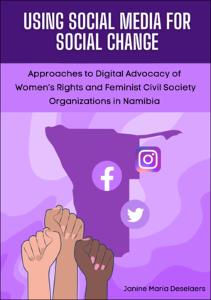Deselaers, Janine María: Using Social Media for Social Change : Approaches to Digital Advocacy of Women's Rights and Feminist Civil Society Organizations in Namibia. - Bonn, 2025. - Dissertation, Rheinische Friedrich-Wilhelms-Universität Bonn.
Online-Ausgabe in bonndoc: https://nbn-resolving.org/urn:nbn:de:hbz:5-83429
Online-Ausgabe in bonndoc: https://nbn-resolving.org/urn:nbn:de:hbz:5-83429
@phdthesis{handle:20.500.11811/13196,
urn: https://nbn-resolving.org/urn:nbn:de:hbz:5-83429,
doi: https://doi.org/10.48565/bonndoc-594,
author = {{Janine María Deselaers}},
title = {Using Social Media for Social Change : Approaches to Digital Advocacy of Women's Rights and Feminist Civil Society Organizations in Namibia},
school = {Rheinische Friedrich-Wilhelms-Universität Bonn},
year = 2025,
month = jul,
note = {This dissertation investigates how civil society organizations (CSOs) working in the field of women’s rights, feminism, and gender justice in Namibia utilize social media and how this shapes their advocacy, organizational practices, and broader impact on their mission. Building on a long history of global activism for women’s rights and gender justice, this research responds to the limited scholarly attention on CSOs in Sub-Saharan Africa, particularly in the context of engaging with digital platforms. Despite major strides, injustices and discrimination based on gender persist across many sectors including politics, labor, health, and media. Namibian CSOs play a crucial role in challenging this status quo.
Through a multi-method approach—comprising content analysis of 15 organizations across three platforms over the course of four years (2018-2021), interviews with eight CSO representatives, and a user survey—this thesis explores the strategic, discursive, and functional dimensions of social media use. It analyzes message intentions, user engagement, platform preferences, organizational approaches and strategies, and responses to challenges such as the digital divide and online harassment.
The findings highlight both the transformative potential and structural limitations of social media in feminist and women’s rights-based activism. Social media platforms facilitate visibility, outreach, and mobilization but also reinforce existing inequalities and dependency on private tech corporations. Many CSOs lack the funds to invest in dedicated digital infrastructure, staff training, paid advertising, or sustained community engagement strategies—factors which are often essential for reaching broader audiences and ensuring long-term impact. This research contributes to global debates on the role of digital activism, the persistence of digital exclusion, and the evolving nature of civil society in the digital era. It emphasizes the need for localized, inclusive strategies and supports feminist critiques of techno-determinism while showcasing the innovation and resilience of Namibian CSOs.},
url = {https://hdl.handle.net/20.500.11811/13196}
}
urn: https://nbn-resolving.org/urn:nbn:de:hbz:5-83429,
doi: https://doi.org/10.48565/bonndoc-594,
author = {{Janine María Deselaers}},
title = {Using Social Media for Social Change : Approaches to Digital Advocacy of Women's Rights and Feminist Civil Society Organizations in Namibia},
school = {Rheinische Friedrich-Wilhelms-Universität Bonn},
year = 2025,
month = jul,
note = {This dissertation investigates how civil society organizations (CSOs) working in the field of women’s rights, feminism, and gender justice in Namibia utilize social media and how this shapes their advocacy, organizational practices, and broader impact on their mission. Building on a long history of global activism for women’s rights and gender justice, this research responds to the limited scholarly attention on CSOs in Sub-Saharan Africa, particularly in the context of engaging with digital platforms. Despite major strides, injustices and discrimination based on gender persist across many sectors including politics, labor, health, and media. Namibian CSOs play a crucial role in challenging this status quo.
Through a multi-method approach—comprising content analysis of 15 organizations across three platforms over the course of four years (2018-2021), interviews with eight CSO representatives, and a user survey—this thesis explores the strategic, discursive, and functional dimensions of social media use. It analyzes message intentions, user engagement, platform preferences, organizational approaches and strategies, and responses to challenges such as the digital divide and online harassment.
The findings highlight both the transformative potential and structural limitations of social media in feminist and women’s rights-based activism. Social media platforms facilitate visibility, outreach, and mobilization but also reinforce existing inequalities and dependency on private tech corporations. Many CSOs lack the funds to invest in dedicated digital infrastructure, staff training, paid advertising, or sustained community engagement strategies—factors which are often essential for reaching broader audiences and ensuring long-term impact. This research contributes to global debates on the role of digital activism, the persistence of digital exclusion, and the evolving nature of civil society in the digital era. It emphasizes the need for localized, inclusive strategies and supports feminist critiques of techno-determinism while showcasing the innovation and resilience of Namibian CSOs.},
url = {https://hdl.handle.net/20.500.11811/13196}
}






